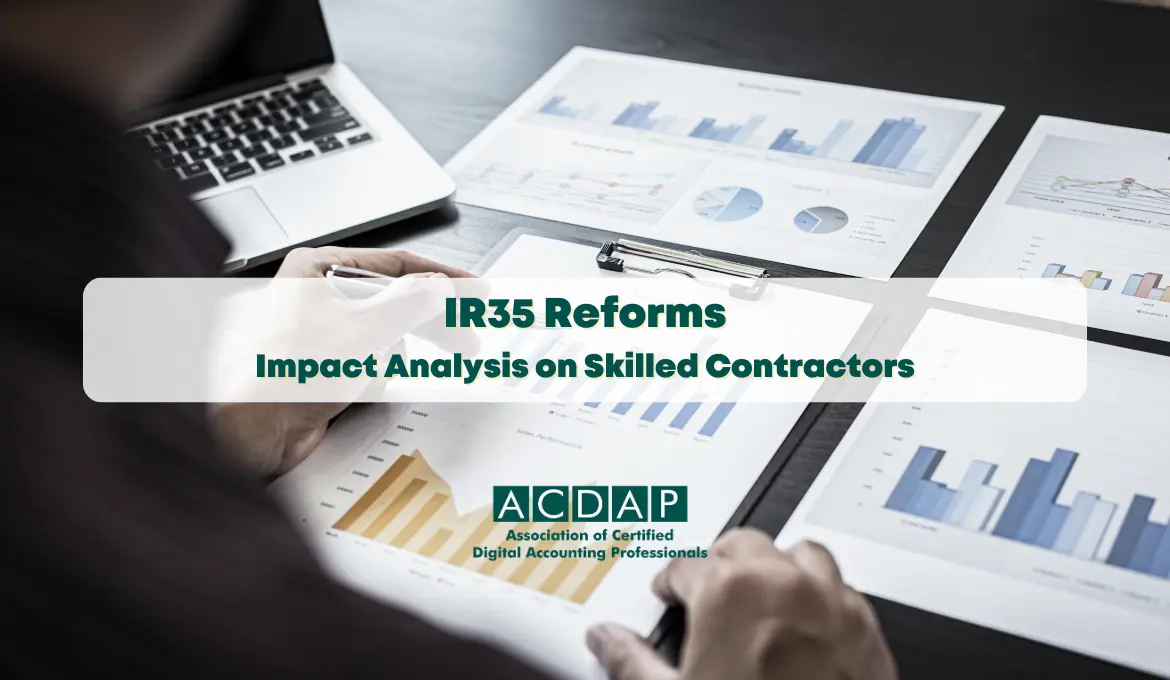The IR35 reforms, aimed at addressing tax avoidance by contractors working through intermediaries, have significant implications for skilled contractors in the UK. These changes affect public and private sector engagements and have considerable debate among contractors, businesses, and tax professionals.
This blog explores the impact of IR35 reforms on skilled contractors, examining the implications for their work arrangements, financial outcomes, and overall industry dynamics.
What is IR35?
The UK government introduced IR35, the Intermediaries Legislation, in 2000. It tackles tax avoidance by workers supplying their services to clients via an intermediary. These include a personal service company (PSC).
But who would be an employee if the intermediary was not used? The legislation ensures that such workers pay broadly the same National Insurance contributions and Income Tax as employees.
Critical Changes in IR35 Reforms
The recent IR35 reforms shift the responsibility for determining the employment status from the individual contractor to the end client (the business receiving the services). This change took effect in the public sector in 2017 and was extended to the private sector in April 2021.
Under the new rules, medium and large-sized businesses must assess whether a contractor falls within IR35 and ensure the payment of correct tax and National Insurance contributions.
Impact on Work Arrangements
- The shift in Employment Status: One of the most significant impacts of the IR35 reforms is the shift in employment status assessments. Many contractors previously considered self-employed may now be classified as employees for tax purposes. This reclassification can alter the dynamics of their engagements, including their relationship with the client, work flexibility, and job security. Contractors need to navigate this new landscape and adjust their work arrangements accordingly.
- Changes in Contracting Demand: The reforms have led to a noticeable shift in the demand for contracting roles. Some businesses, wary of the administrative burden and potential liabilities, have opted to reduce their reliance on contractors or transition them into permanent roles. Others have adopted a cautious approach, favouring contractors outside IR35 to minimise compliance risks. This shift impacts the availability of contracting opportunities and the nature of engagements contractors can expect.
- Project Continuity and Client Relations: The new rules have also affected project continuity and client relations. Contractors deemed to be within IR35 may face increased scrutiny and a different working relationship with their clients. The need for clear documentation and ongoing compliance checks can lead to disruptions in ongoing projects. Contractors and clients must work collaboratively to ensure that engagements are compliant while maintaining productive working relationships.
Financial Implications
- Increased Tax Liabilities: Contractors found to be within IR35 face increased tax liabilities. They are subject to employee-level Income Tax and National Insurance contributions, which can significantly reduce their take-home pay compared to the self-employed tax regime. This change necessitates a thorough financial reassessment for contractors, who must account for the reduced income and potentially higher costs associated with compliance.
- Impact on Contractor Rates: Some contractors have attempted to negotiate higher rates to offset their reduced earnings in response to the increased tax burden. However, the success of such negotiations varies across industries and clients. While some clients may be willing to pay higher rates to retain skilled contractors, others may seek to cut costs by engaging workers outside IR35 or transitioning to permanent employment models.
- Administrative and Compliance Costs: The IR35 reforms introduce additional administrative and compliance costs for contractors. They must ensure their contracts and working practices align with IR35 requirements and maintain detailed records to support their employment status determinations. This increased administrative burden may necessitate professional advice or services, further adding to contractors' costs.
Industry Dynamics and Future Outlook
- Shifts in the Contracting Market: The IR35 reforms have triggered shifts in the contracting market, influencing how businesses engage with contractors and how contractors position themselves. There is a growing trend towards specialisation and niche skills, as contractors with unique expertise can command better rates and more favourable terms. Additionally, businesses increasingly seek contractors who comply with IR35, leading to a more selective hiring process.
- Long-term Effects on Skilled Contractors: The IR35 reforms may lead to a more regulated and transparent contracting market in the long term. While this can bring benefits such as greater tax compliance and reduced avoidance, it also burdens skilled contractors more. Those who can adapt to the new regulations and demonstrate their value to clients will likely thrive, while others may need to consider alternative employment models or career paths.
Government and Industry Responses
The government and industry stakeholders continue to monitor and respond to the effects of the IR35 reforms. Ongoing consultations and reviews aim to address concerns and refine the legislation.
Industry bodies and professional associations advocate for more precise guidelines and support for contractors, emphasising the need for a balanced approach that ensures fair taxation without stifling the flexibility and innovation that contractors bring to the economy.
Preparing for the Future
For skilled contractors, preparing for the future in light of IR35 involves staying informed about the latest developments, seeking professional advice, and adapting business practices.
Embracing digital tools for compliance, building strong client relationships, and exploring diversified income streams can help contractors navigate the evolving landscape. By proactively addressing the challenges posed by IR35, contractors can position themselves for success in a changing market.
Conclusion
The IR35 reforms represent a significant shift in the UK's approach to taxing skilled contractors, with far-reaching implications for work arrangements, financial outcomes, and industry dynamics. While the changes present challenges, they also offer opportunities for contractors to adapt, specialise, and thrive in a more regulated environment.
By understanding the impact of IR35, staying informed, and taking proactive steps, skilled contractors can navigate this new landscape and continue contributing their valuable expertise to the UK economy.


























